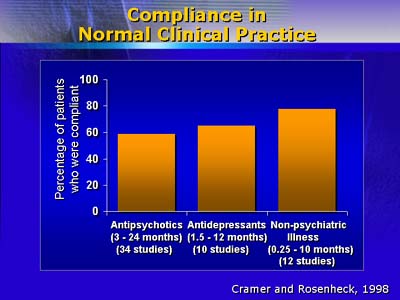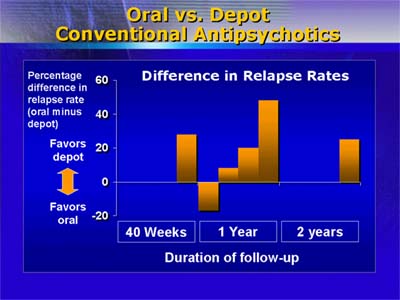Dr. Kane pointed out that while clozapine is the most effective medication for non-responsive patients with schizophrenia, a substantial proportion of schizophrenic patients do not respond to clozapine. The same is true for other atypical antipsychotics
Although the new drugs induce fewer adverse effects, lack of efficacy prompts approximately one-third of patients to discontinue treatment, reported Dr. Kane. Consistently, 30-50% of schizophrenic patients fail to achieve a 20% reduction of symptoms with the newer atypical antipsychotics.
Dr. Kane further pointed out that the mean effect size of clinical efficacy for the newer antipsychotic medications is only 0.25 in 2000 patients. This means that response to these medications is only 25 percent better overall than response to placebo. Even so, the small effect size may derive in part from selection of treatment refractory patients for clinical trials. The effect size under naturalistic conditions may be higher. By comparison, family interventions have a mean effect size of 0.20 for reducing relapse rate in schizophrenic patients. Pharmacotherapy may therefore be only minimally more effective than psychosocial interventions.

Dr. Kane believes that both physicians and laypersons remain unaware of key information about psychiatric disorders. For example, many psychiatrists still do not know how likely a second psychotic episode may be in a patient who has had an initial episode. Moreover, few families realize that psychotropic medications are needed for optimal treatment of depression, panic, or even schizophrenia. Lack of awareness of these and other issues complicates effective treatment and adequate medication compliance. In fact, about 16% of first-episode schizophrenic patients will relapse within the first year, 53.7% by the second, and 82% by five-year follow-up.

Dr. Kane asserts that even the lower relapse rates associated with the newer antipsychotic medications remain too high. He therefore recommends drug development based on alternative neurotransmitter systems. He also recommends intensive pharmacogenomic studies to help match subgroups of patients with the medications to which they may be most likely to respond.